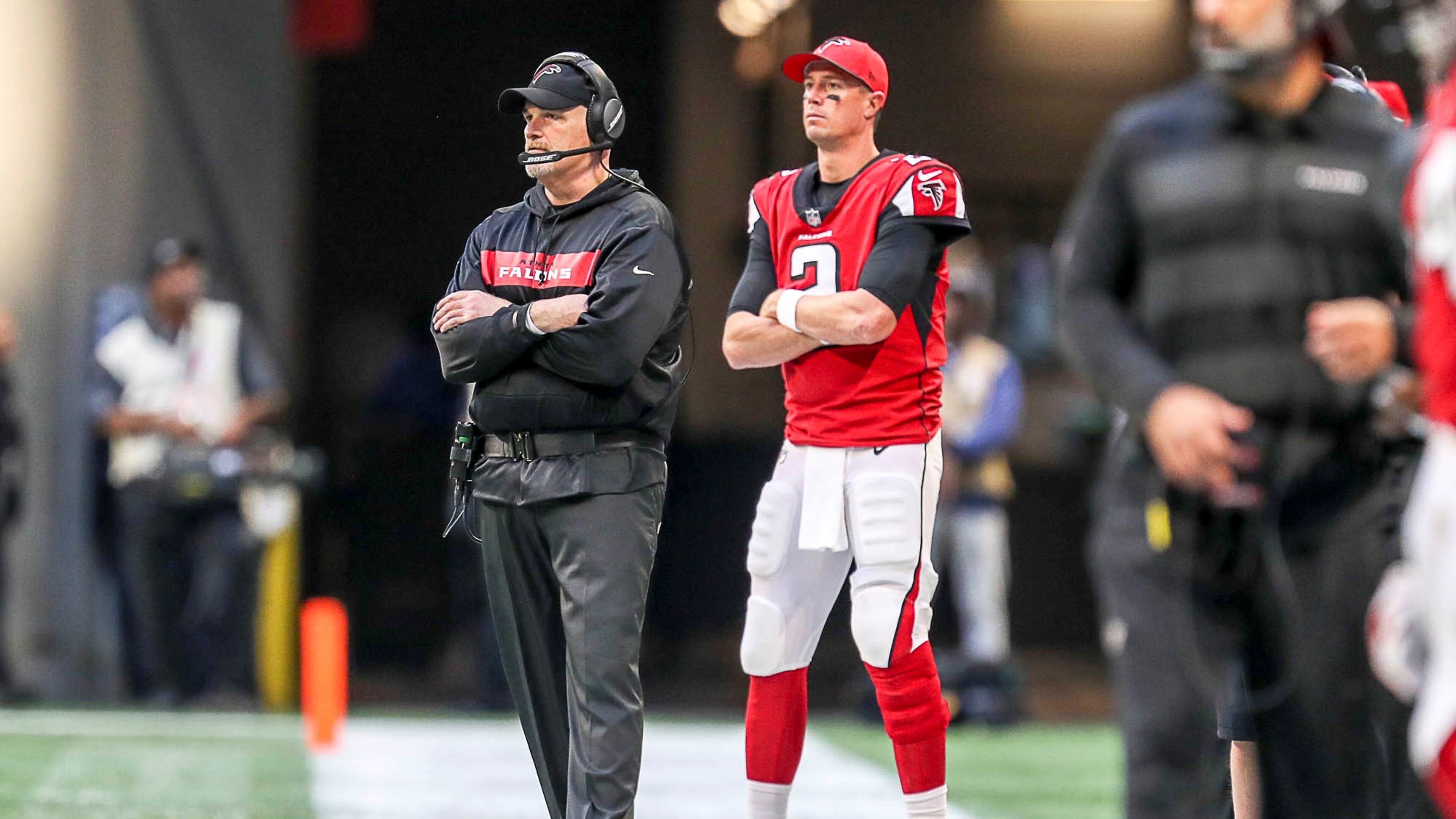Much is wrong with Falcons. Can Dan Quinn can get them right?

The Falcons have lost four games in a row. They lost six consecutive in 2015, coach Dan Quinn’s first season. That’s why it’s noteworthy that, more than once, Quinn has said the Falcons are being challenged more now than at any time during his tenure.
He’s not wrong. The context is different now. The Falcons are supposed to be good, not rebuilding. Quinn is trying to get them back to the Super Bowl, not learning how to get there. And it’s not just the quantity of losses, but the quality.
The Falcons no-showed at Cleveland after they looked primed to make a run. Against the Cowboys they gave in at the end, a habit they had seemed to break. They fumbled away any chance of winning at New Orleans and couldn’t stop the one-dimensional Ravens from running straight at and over them.
The Falcons fix one thing, and another problem surfaces. Solve that issue, and the first thing breaks again, along with something else. That’s why the Falcons are 4-8 and head to Green Bay on Sunday as five-point underdogs.
Everything has gone wrong with the Falcons. For the first time, I wonder if Quinn can get them right.
Quinn has always had faults, with shaky game management at the top of the list. Hiring Steve Sarkisian as offensive coordinator seemed suspect at the time, more so now. Quinn has personnel power, so the bad shape of both lines falls on him and general manager Thomas Dimitroff.
But, despite Quinn’s flaws, I always had the sense that his program is sound. Now, though, what worked before doesn’t work anymore. Quinn must find a balance between sticking to his principles and shaking up his formula.
“Sometimes you don’t like to admit it, but that’s where the learning takes place the most, when you’ve gone through some adversity or have gone through things that you haven’t wanted,” Quinn said. “So take those lessons. Then, at some point, you’re going to have to put that behind you in order to move forward because just not wanting to feel bad anymore, that’s not a good way to make progress.”
The Falcons say that point is now. Yes, they’ve been angry and frustrated. Sure, they are disappointed.
But, the Falcons insist, they are not down.
“There’s no ‘poor me’ going on,” Julio Jones said.
The Falcons have a close-to-zero chance to qualify for the playoffs. They still have much to play for beyond competitive, professional pride. Over the final four games Quinn can show that he still can take the Falcons places, and his players can prove there are enough leaders among them to pull in that direction.
Can Quinn still coax inspired, surprising efforts from his team? We’ve seen it only once this season, at Washington, and haven’t seen it since.
Can Quinn and his staff come up with a plan to outmaneuver the Packers? The Browns did it to the Falcons — they had fits defending Cleveland’s unusual formations -- but rarely have the Falcons done it to anyone else.
The players need to do their part, too. That’s a point Jones keeps emphasizing.
“It’s never too late to get things going because we’ve got to see the kind of guys we have on this team, and what kind of character that we have and keep battling,” Jones said.
Thing is, the Falcons can play with more fire the rest of the way and still lose more than they win. The intangibles are just part of the picture. They have so many practical questions with no easy answers.
How can the Falcons run the ball when their offensive line so often gets overwhelmed? How can they pass when opponents need not respect their play-action or deploy defensive backs against the run? What happens if, like during the Ravens game, Matt Ryan and Jones can’t connect on the few chances they manufacture to go deep?
Quinn said his defensive line has been “terrible” against run and pass. (Not re-signing free-agent tackle Dontari Poe is one of those line decisions that looks bad.). The Falcons already are playing a lot of eight-man fronts, so how does that get better?
Maybe it’s all too much for the Falcons to figure out, given their personnel limitations. Any fair assessment must acknowledge that a string of injuries to key players has been a significant factor in their struggles. But those injuries don’t excuse the poor efforts against Cleveland, New Orleans and Baltimore.
Quinn said some of the players out with injuries also are a “good part of the culture” and not having them has affected the team’s “style and attitude.” But among Quinn’s strengths has been his ability to plug in new players and get them with the program. That’s something else that’s missing.
Quinn’s “Brotherhood” is battered, but is it broken? If so, can he fix it? Quinn has four games left this season to show that he can.

